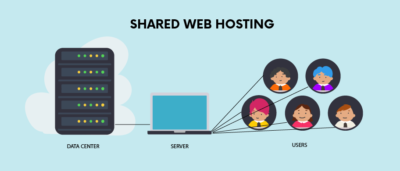Blog
Understanding Shared Web Hosting and Its Importance

Demystifying Shared Web Hosting: Affordable Convenience with Considerations
In the ever-expanding digital landscape, establishing a strong online presence has become crucial for businesses and individuals alike. One of the first steps in this journey is choosing the right web hosting plan. Shared web hosting is a popular option that offers cost-effectiveness and convenience. In this article, we’ll delve into the world of shared web hosting, explore its benefits, and discuss the potential challenges that come with it.

I. Introduction
A. Definition of Shared Web Hosting
Shared web hosting is like sharing an apartment in a bustling city. Just as multiple residents share the same building, shared hosting involves multiple websites sharing resources on a single server. Each website gets a portion of server space, memory, and other resources necessary for its operation. This economical approach allows multiple users to host their websites without investing in a dedicated server.
B. Importance of Choosing the Right Plan for Your Website
Choosing the right hosting plan is akin to selecting the perfect foundation for a house. Your website’s performance, security, and user experience largely depend on this choice. Shared hosting plans are a great starting point, especially for small businesses and beginners. However, it’s crucial to understand both the benefits and challenges they entail.
II. Benefits of Shared Web Hosting

A. Cost-Effectiveness
For those dipping their toes into the online realm, cost considerations are paramount. Shared web hosting is remarkably budget-friendly, making it an attractive choice for startups, personal blogs, and small businesses with limited financial resources. By sharing server costs with other websites, you can enjoy professional hosting services without breaking the bank.

B. Resource Sharing and Scalability
Imagine a communal garden where everyone contributes and benefits from the shared space. Similarly, shared hosting allows websites to share server resources, such as bandwidth and storage. While this pooling of resources may lead to performance bottlenecks under heavy traffic, most hosting providers offer scalability options to mitigate these issues. As your website grows, you can easily upgrade your plan to accommodate increased demands.

C. User-Friendly for Beginners
Navigating the vast world of web hosting can be overwhelming, especially for beginners. Shared hosting providers often offer user-friendly interfaces and management tools, simplifying the setup and maintenance process. This is invaluable for those taking their first steps in building and managing a website.
III. Potential Challenges of Shared Web Hosting
A. Performance Limitations
Just as a shared workspace might occasionally get crowded, shared web hosting can experience performance limitations during peak traffic times. Since multiple websites are vying for the same resources, your site’s loading speed and responsiveness might be compromised. However, hosting providers usually monitor server performance and allocate resources fairly to ensure a satisfactory user experience.
In a shared environment, security is a key concern. If one website on the server falls victim to a security breach, it could potentially affect other websites hosted on the same server. However, reputable hosting companies implement robust security measures, such as regular software updates, firewalls, and malware scanning, to minimize such risks.
C. Resource Allocation Issues
Resource hogging can be likened to a potluck dinner, where one person takes more than their fair share of the pie. In shared hosting, some websites might utilize more resources than others, leading to allocation issues. This could impact the performance of neighboring websites. Thankfully, hosting providers employ resource monitoring and fair allocation mechanisms to prevent this from becoming a widespread problem.
conclusion
In conclusion, shared web hosting is a cost-effective and beginner-friendly option for individuals and businesses looking to establish an online presence. While it offers numerous benefits, it’s important to be aware of potential challenges such as performance limitations, security concerns, and resource allocation issues. By understanding these factors and choosing a reliable hosting provider, you can embark on your online journey with confidence, knowing that your website is in capable hands.
